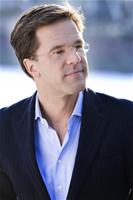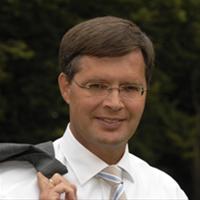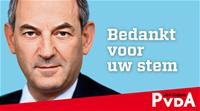Dutch are Split between Left and Right, but United against Immigrants
Ralitsa Kovacheva, June 10, 2010
 The Dutch elections - the first in the eurozone after the debt crisis broke out - has shown voters' split between more stringent economic and fiscal measures and the preservation of social benefits. While the counting of votes is almost completed, it shows that the centre-right Liberal Party of Mark Rutte (VVD) is getting 31 seats in the 150-member Dutch parliament, followed by the centre-left Labour Party with only one place less.
The Dutch elections - the first in the eurozone after the debt crisis broke out - has shown voters' split between more stringent economic and fiscal measures and the preservation of social benefits. While the counting of votes is almost completed, it shows that the centre-right Liberal Party of Mark Rutte (VVD) is getting 31 seats in the 150-member Dutch parliament, followed by the centre-left Labour Party with only one place less.
The big surprise of the election, however, is the third largest parliamentary force - the xenophobic Freedom Party of Geert Wilders (PVV) with 24 seats. A total of 10 parties are entering Parliament, and Mr Rutte must get the support of at least 76 deputies to secure a majority, which portends long and difficult coalition negotiations.
The ruling Christian Democratic Party of Prime Minister Jan Peter Balkenende  suffered a major defeat by winning as many as half of the seats it won in the previous election in 2006 - 21 now against 41 then. The ruling coalition between Christian Democrats and the Labour Party fell apart because of the Labour Party's refusal to support extending Dutch forces' mandate in Afghanistan within the NATO mission. After eight years as a prime minister, Mr Balkenende resigned as party leader and announced he was leaving politics but would remain prime minister until the formation of the new coalition.
suffered a major defeat by winning as many as half of the seats it won in the previous election in 2006 - 21 now against 41 then. The ruling coalition between Christian Democrats and the Labour Party fell apart because of the Labour Party's refusal to support extending Dutch forces' mandate in Afghanistan within the NATO mission. After eight years as a prime minister, Mr Balkenende resigned as party leader and announced he was leaving politics but would remain prime minister until the formation of the new coalition.
And it has to solve some serious financial problems. The Dutch budget deficit in 2009 was 5.3% and is projected to grow by at least one percent this year. The public debt is also increasing, surpassing the 60% limit of the Stability and Growth Pact. The fifth largest economy in the eurozone, however, is already growing and economic prospects are good, which could be the reason why that Dutch are not so convinced of the need for severe austerity measures as the Czechs, for example.
One possibility is that the Liberals will try to form a centre-right coalition with the Christian Democrats and the Freedom Party. Another option is to negotiate with the centre-left Labour Party. A "purple coalition" between the Liberals and the Labour Party is possible and can be viable, Marcel Boogers, political science professor at the Tilburg University, said quoted by EurActiv.
 The main difference between the two parties is the stringency of the measures to be taken to deal with the excessive deficit. The leader of the Labour Party and a former mayor of Amsterdam, Job Cohen, believes that "although circumstances are difficult, we again will take our responsibility to make sure our country continues down the social road".
The main difference between the two parties is the stringency of the measures to be taken to deal with the excessive deficit. The leader of the Labour Party and a former mayor of Amsterdam, Job Cohen, believes that "although circumstances are difficult, we again will take our responsibility to make sure our country continues down the social road".
The leader of the Liberals Mark Rutte is much more extreme in his views. The 43-year-old former human resources manager at the Anglo-Dutch giant Unilever (and probably the Netherlands most eligible bachelor) appealed for strong austerity measures, including a reduction of the Dutch contribution to the EU budget. Mr Rutte supports the imposition of stricter rules for immigrants and called for the Netherlands to receive an opt-out of the common European rules on asylum and immigration.
In this respect, he could find a partner in the face of Geert Wilders – the extreme  blond leader of the Freedom Party. His campaign motto was "Stop the Islamisation of the Netherlands." Wilders's ideas range from banning the Koran to imposing tax on Muslim head scarves. "More security, less crime, less immigration, less Islam - that is what the Netherlands has chosen," Wilders commented on its party good election results.
blond leader of the Freedom Party. His campaign motto was "Stop the Islamisation of the Netherlands." Wilders's ideas range from banning the Koran to imposing tax on Muslim head scarves. "More security, less crime, less immigration, less Islam - that is what the Netherlands has chosen," Wilders commented on its party good election results.
The coalition negotiations are yet to begin and all the participants will probably have to make compromises. Not only the country's governance will depend on the final result but also the position the Netherlands will take on major European issues.
 Klaus Regling | © Council of the EU
Klaus Regling | © Council of the EU Mario Centeno | © Council of the EU
Mario Centeno | © Council of the EU Mario Centeno | © Council of the EU
Mario Centeno | © Council of the EU